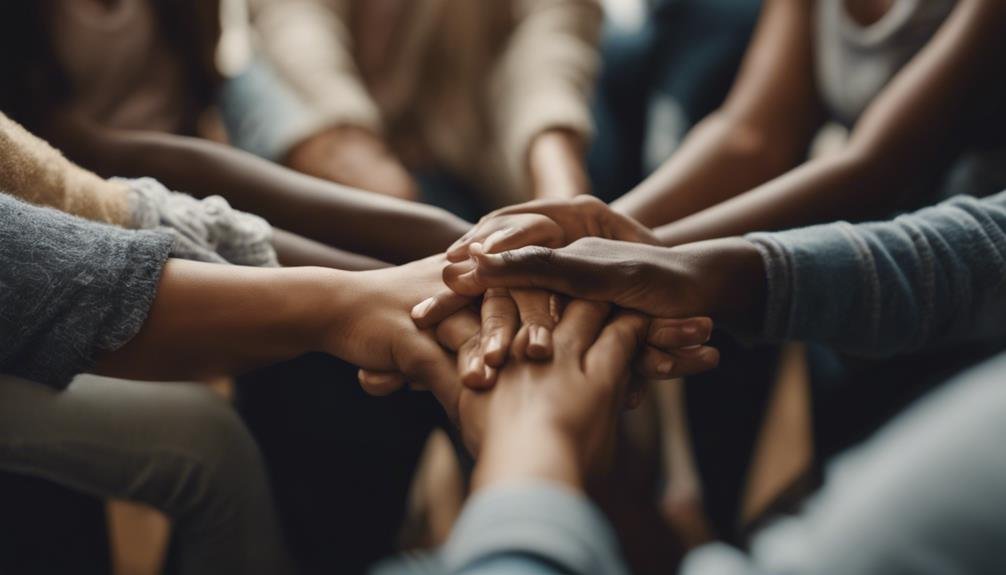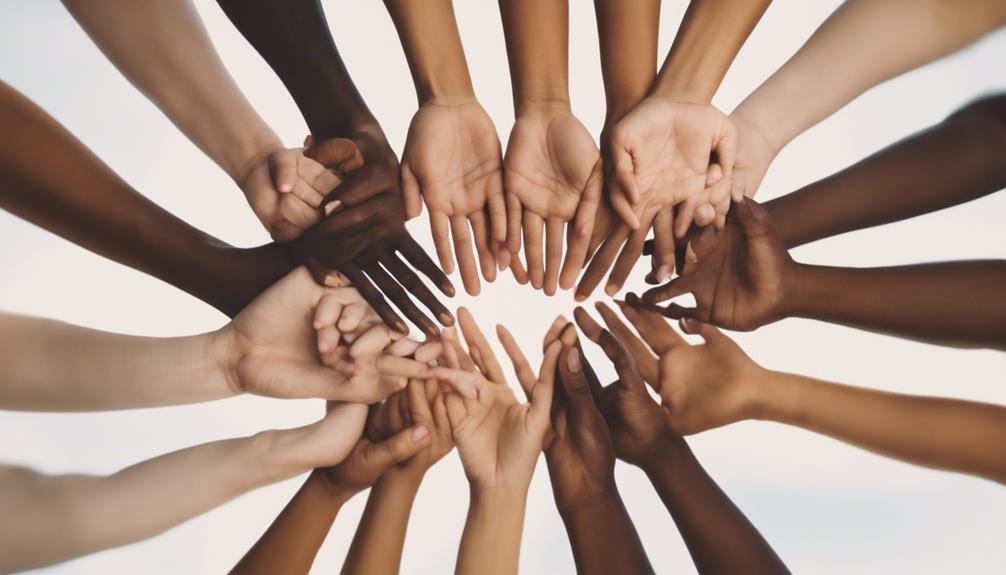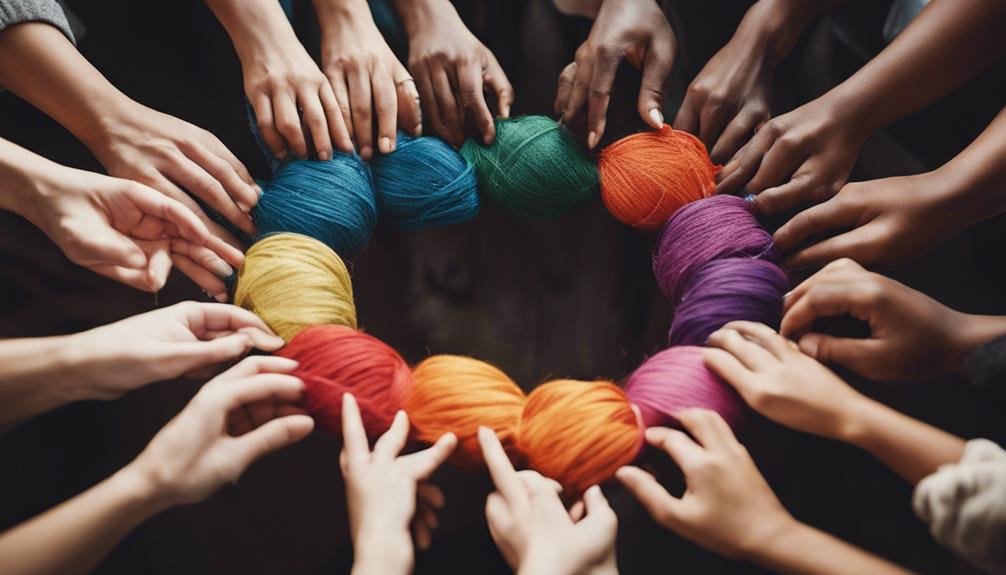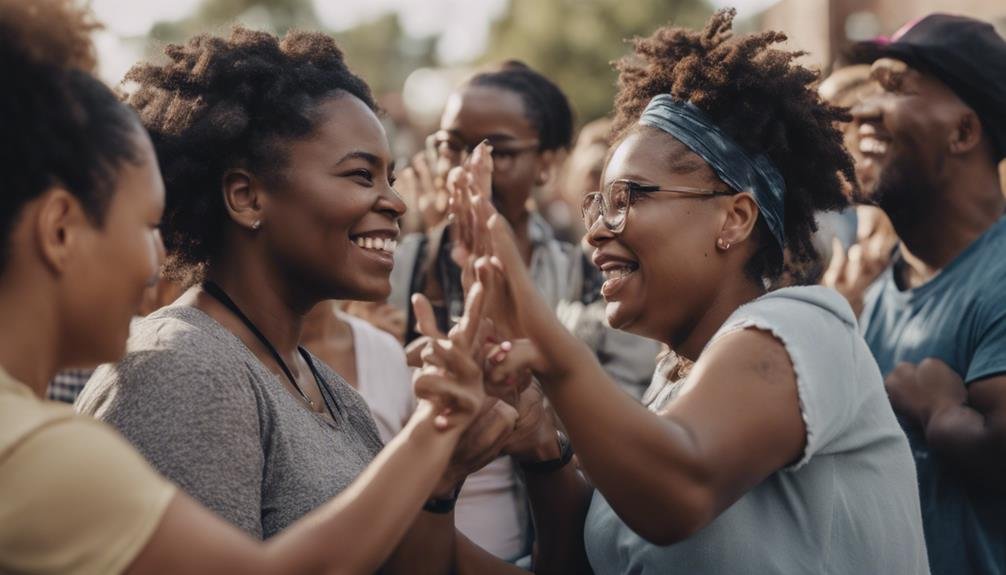Support services empower survivors to rebuild with resilience and hope. Legal aid offers assistance with protective orders and court proceedings. Shelter and childcare provide safety and support away from abusers. Employment programs focus on skills and financial independence. Peer groups offer understanding and connections. Validation acknowledges trauma impact and fosters healing. Resources include therapy, wellness retreats, and self-care practices. Empower survivors to make informed choices and prioritize safety. Awareness campaigns advocate for change and support networks. The transformative power of support helps survivors heal and thrive.
Key Takeaways
- Provide legal support for survivors seeking protection and justice.
- Offer shelter and childcare services for safety and healing.
- Empower survivors through job training and career development.
- Foster peer support connections for shared understanding and healing.
- Advocate for survivor rights, validation, and policy reform.
Legal Support for Survivors
We offer survivors valuable legal support to navigate the complexities of the legal system and obtain the protections they need. Survivors of sexual assault and domestic violence can access free legal services through organizations specializing in these cases.
Our legal advocates are here to help survivors understand their rights, whether it’s assistance with protective orders, child custody, or divorce proceedings. Managing the legal system can be overwhelming, but we provide support every step of the way.
Our team assists with court appearances, filing paperwork, and even helps survivors obtain legal representation if needed. By offering this legal assistance, we empower survivors to pursue justice, safety, and autonomy in their journey towards healing.
Access to Shelter and Childcare

As survivors seeking safety, having access to shelters can provide us with a sense of security and stability during a tumultuous time.
Childcare assistance is equally essential, ensuring that our children are cared for while we focus on our healing journey.
Shelter Availability
Securing access to shelter and childcare services plays an essential role in providing survivors of domestic violence with the safety and support needed to start rebuilding their lives. For survivors of sexual abuse and domestic violence, having a safe haven where they can find refuge is indispensable. Shelter availability guarantees that survivors have a confidential space away from their abusers, where they can receive the necessary support services to begin their healing journey.
Moreover, childcare services offered at shelters play a significant role in empowering survivors. These services allow survivors to focus on their recovery and rebuilding process without the added worry of their children’s safety.
By having access to shelter and childcare, survivors are less likely to return to abusive situations due to a lack of housing options, giving them the strength and resources to make informed decisions about their future.
Empowering survivors through shelter availability is a critical step towards breaking the cycle of abuse and fostering a path to a brighter tomorrow.
Childcare Assistance
Access to childcare assistance is an essential lifeline for survivors seeking shelter services, enabling them to focus on their healing journey with peace of mind. Childcare benefits play a pivotal role in providing parental support and family assistance to survivors.
By offering childcare services, we help survivors attend important appointments, meetings, and therapy sessions without the added worry of their children’s care. This support also empowers survivors to participate in empowerment programs, job interviews, and skill-building activities, facilitating their path towards independence and stability.
Employment Assistance Programs
Recognizing the significance of job training opportunities and career guidance services for survivors of domestic violence and sexual assault.
These programs offer tailored support to help survivors secure stable employment and gain financial independence.
Job Training Opportunities
Through job training opportunities offered by employment assistance programs, survivors can acquire essential skills to enhance their readiness for entering the workforce. These programs focus on skill development, paving the way for career advancement and ultimately leading survivors towards financial independence.
By providing avenues for learning new trades and refining existing skills, job training empowers survivors of domestic violence and sexual assault to increase their employability and secure stable employment.
Job training not only equips survivors with the tools needed for success in the workforce but also instills a sense of confidence and self-sufficiency. The ability to access these training opportunities can be pivotal, offering survivors a pathway to rebuild their lives with dignity and resilience.
Employment assistance programs that include resume building, interview preparation, and job placement services play an important role in supporting survivors on their journey towards independence and empowerment. The impact of job training extends far beyond just acquiring skills; it opens doors to a brighter future filled with possibilities for survivors to thrive.
Career Guidance Services
Career Guidance Services play a pivotal role in empowering survivors of domestic violence and sexual assault by offering tailored employment assistance programs aimed at securing stable and fulfilling jobs. These services go beyond just job placement; they provide survivors with the necessary tools for career advancement, job security, and professional growth.
By offering resume building, job search support, and interview preparation tailored to survivors’ needs, these programs help individuals move into the workforce with confidence and readiness.
Empowerment through employment is a key focus, as these services aim to promote financial independence and self-sufficiency among survivors. Access to resources for skill development, career planning, and guiding individuals through the job market equips survivors with the knowledge and support needed to rebuild their lives and achieve economic stability.
Through Career Guidance Services, survivors are directed towards opportunities that not only provide a source of income but also pave the way for long-term success and personal growth.
Peer Support and Connection

In peer support groups, survivors find a safe haven to share their stories and build connections with others who truly understand their experiences.
Through online forums and virtual meetups, individuals connect over shared survivor stories, finding solace in the understanding and empathy of their peers.
These peer connections offer emotional support that reduces feelings of isolation and validates the challenges survivors face.
Validation of Survivor Experiences

Recognizing and affirming the impact of trauma on survivors who’ve experienced abuse is essential for validating their experiences and fostering healing. When we actively listen, believe survivors’ accounts, and create a safe space for them to share their stories without judgment, we offer critical emotional validation. This validation communicates understanding, compassion, and support, helping survivors feel heard and respected. By acknowledging the reality of their experiences, we contribute to trauma recovery, rebuilding trust, self-esteem, and empowerment in those who’ve faced abuse.
Emotional validation is a powerful tool in survivor empowerment. It helps individuals reclaim agency and control over their lives. By validating survivor experiences, advocates and supporters play an important role in the healing process. Each instance of validation is a step towards rebuilding the shattered pieces of a survivor’s sense of self-worth and security. Through this validation, we can help survivors navigate their journey towards healing and find strength in their resilience.
Advocacy for Survivor Rights

Empowering survivors through advocacy involves championing their rights and needs to create a supportive environment for healing and growth. Advocacy strategies play a vital role in promoting survivor empowerment, ensuring trauma-informed care, and fostering survivor resilience. By advocating for survivor rights and policy reform, we can work towards creating a more just and compassionate society for those who’ve experienced trauma.
Advocates serve as allies, helping survivors navigate complex legal systems, access necessary services, and break down barriers to recovery. Through survivor rights advocacy, we aim to raise awareness, promote change, and address systemic issues that perpetuate cycles of trauma. By advocating for policy reform, we can create lasting impacts that benefit survivors and prevent future instances of harm.
Together, through our collective efforts and commitment to survivor empowerment, we can create a more supportive and inclusive environment where survivors can heal, thrive, and reclaim their sense of agency and dignity.
Healing and Well-being Resources

By connecting survivors with a range of healing and well-being resources, we aim to provide comprehensive support for their journey towards healing and growth. Survivors of childhood sexual abuse can benefit greatly from engaging in healing workshops and adopting self-care practices.
Therapy options and mental health resources offer crucial support for survivors as they navigate the complexities of their trauma. Wellness retreats provide a nurturing environment for survivors to focus on their healing journey, while holistic healing approaches encompass the mind, body, and spirit in the recovery process.
EmpowerSurvivors offers a variety of avenues for survivors to access these resources, whether through online platforms, in-person events, or support groups led by individuals with lived experiences. Subscribing to our newsletter guarantees survivors receive up-to-date information on healing resources, community support, and exclusive updates.
Additionally, our podcast serves as an educational tool, covering topics related to childhood sexual abuse, healing, and recovery, further equipping survivors with knowledge and support on their path to healing.
Empowering Choices and Decision-Making

Starting on the journey of healing and growth involves empowering survivors to make informed choices and decisions that align with their well-being and safety. Survivor empowerment is vital in fostering decision-making skills and promoting choice autonomy.
By providing access to resources like attorneys, guardians ad litem, and parent coordinators, survivors can navigate their options with support and guidance.
Offering a range of support services such as shelter, childcare, and employment assistance can empower survivors to make choices that lead to a brighter future.
Connecting survivors with others for solidarity and validation can enhance their decision-making abilities and reinforce their sense of autonomy in choosing their path forward.
Echoing back what survivors express and validating their experiences are important forms of empowerment in the healing process.
Alerting survivors to signs of clear danger, providing danger assessments, and involving authorities when necessary can further empower survivors to prioritize their safety above all else.
Let’s continue to empower survivors to make choices that support their well-being and autonomy.
Community Engagement and Awareness

Engaging with the community plays a pivotal role in raising awareness about domestic violence and sexual assault. Community involvement is essential in supporting survivor empowerment through various initiatives.
Awareness campaigns and public education events serve as powerful tools to educate society on how to assist survivors and prevent abuse. By fostering support networks and implementing prevention initiatives, we create a safe space for survivors to seek help and healing.
Collaborating with local organizations and businesses amplifies the impact of these awareness efforts, reaching a wider audience and mobilizing resources for survivors in need. Empowering survivors through community engagement involves active participation and advocacy for change.
Together, we can make a difference by standing up against domestic violence and sexual assault, creating a community that’s informed, supportive, and committed to ending these injustices. Let’s work hand in hand to build a future where all individuals can live free from fear and violence.
Frequently Asked Questions
What Is the Best Way to Provide Support to Survivors?
When supporting survivors, active listening, emotional validation, and connecting them with community resources are key.
By actively listening to survivors’ experiences, we show empathy and create a safe space for them to share.
Providing emotional validation helps survivors feel understood and supported in their healing journey.
Connecting survivors with community resources offers additional support and avenues for empowerment.
Together, we can create a network of care and understanding for survivors to find healing and strength.
Conclusion
In supporting survivors, we provide a beacon of hope in the darkness, a lifeline in the storm. Together, we stand as pillars of strength, guiding and uplifting those who’ve faced unimaginable challenges.
Let’s continue to empower, support, and advocate for survivors, creating a world where healing and justice prevail. Join us on this journey of resilience and compassion, where every voice is heard and every heart is embraced.
Together, we can make a difference.





